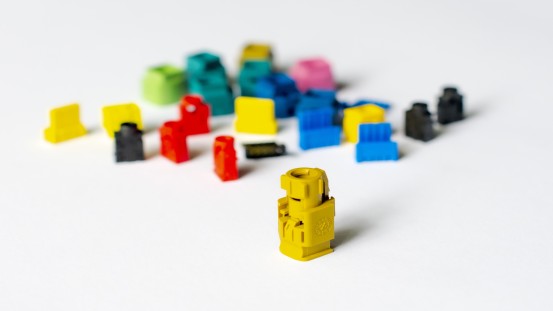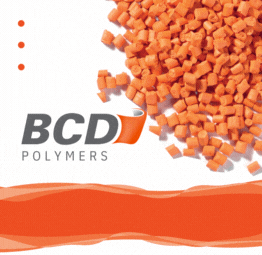Lightweight and torsion-resistant
One event highlight from Envalior will be the world’s first series-production part manufactured using hollow-profile hybrid technology. The front-end support was developed in collaboration with the Chinese system supplier Dongfang Jiangsu and replaces a welded metal construction. “This component is proof that our new lightweight technology is already in production,” says Dr. Matthias Theunissen, Project Manager Lightweight at Envalior. The hollow-profile hybrid technology is a further development of the plastic-metal composite technology and uses hollow metal profiles instead of steel or aluminum sheets. It results in components that are around 20-30 percent lighter as well as having increased torsion resistance and dimensional stability. Major potential applications of hollow-profile hybrid technology include the manufacture of components such as highly integrated instrument panel crossbeams. Dr. Theunissen will be presenting this new technology and the series-production part in more detail at the congress on Thursday, June 22, at 9:30 a.m. in a presentation entitled “From Idea to Series Production: New Hollow-Profile Hybrids Enabled by Polyamides with High Flowability.”
High resistance to thermal, dynamic and mechanical stressing
Examples of a material innovation for the lightweight construction of electric motors are the various Stanyl® polyamide 46 compounds from Envalior. They are capable of resisting the kind of extreme thermal, dynamic and mechanical stressing that the housings for high-speed ball bearings must withstand. “The housings can be designed to be extremely small and thin-walled and are ideal for miniature ball bearings that operate at speeds of up to 30,000 rpm at low torque,” says Dr. Tamim Sidiki, Global Marketing Director of Mobility at Envalior. Envalior will be showcasing one such bearing housing at the congress in Mannheim.
Alternative to steel and aluminum
Another highlight from Envalior is a new, continuous-fiber-reinforced composite marketed under the Tepex® brand. “It passes market-standard thermal runaway tests for the battery housings in electric vehicles on test specimens less than two millimeters thick and so represents a lightweight alternative to materials such as steel or aluminum for battery housings,” says Haspel. The tests simulate the extreme stresses to which battery housings are exposed if battery cells catch fire. Envalior also spends a great deal of time on tests examining the feasibility of injection-molding large-format battery housings as an alternative to compression molding. One approach here is to use large Tepex® blanks as bases for low-profile housings. “This allows to reduce the injection pressure and use smaller injection-molding machines with much lower clamping forces, leading to competitive manufacturing costs,” says Haspel. These studies will also be discussed in the talk “Engineering plastics as enablers for next-generation HV battery systems,” which will be given at the congress by Envalior’s Julian Haspel and Dr. Christopher Höfs on June 21 at 5 p.m.
Unlimited storage, unlimited choice of colors
One real eye-catcher on Envalior’s stand will be the colorful range of FAKRA connectors for connectivity applications such as navigation systems, antennas and advanced driver assistance system sensors. The connectors are made from ForTii® ACE. These polyphthalamide compounds combine the low moisture absorption and color and dimensional stability characteristic of polyesters with the high-quality mechanical properties and unlimited dyeing capability of polyamides. The compounds exhibit long-term thermal stability up to 180°C as well as exceptional tracking resistance and dielectric strength. “As far as we know, these are the only polyamides in the world that fulfill the JEDEC MSL1 standard. This means that the compounds and the components made from them can be stored for an unlimited time without the need for any specific packaging to protect them against moisture,” says Sidiki. The product range also includes halogen-free, flame-retardant variants and variants that inhibit electrical corrosion on metal contacts.
Longer service life, protection against thermal runaway
Manufacturers of electric vehicles generally prefer battery cells with a high energy density so that they can save weight with fewer cells. The problem, however, is that these cells tend to be more prone to undergo thermal runaway. But help is at hand in the form of the Stanyl® SN-PURE electrolyte additive from Envalior. Even at contents as low as 0.5 to around 5 percent, the succinonitrile forms a protective layer on the cathode that thermally stabilizes the cells, maintains the cell capacity at a high level and prevents the formation of hazardous gases even after numerous charge/discharge cycles. “With an all-European supply chain, we are among the world’s biggest producers of the additive. Thanks to its high purity and very low ion content and residual moisture, it is more effective than other succinonitriles and also adiponitriles, which significantly reduces the risk of costly electric vehicle battery recall campaigns,” says Sidiki.
On the road toward the circular economy and climate neutrality
By 2030, Envalior wants to include bio-based and recycled product variants across its entire portfolio with a view to establishing sustainable material cycles and becoming climate-neutral. One product example here is the new Tepex® variants made from polyamide – based on castor oil – and flax fibers. These semi-finished products are ideal for the structural lightweight construction of components such as seat shells and battery holders. Other bio-based materials include the polyamide 4,10 compounds EcoPaXX®, which are also based on castor oil. These can be used to make holders, thermal management components and exposed covers. Examples of circular materials include the polyamide 6 product ranges Durethan® ECO and Akulon® RePurposed. The latter are developed using recycled material from old fishing nets, which are clogging up the oceans, and can be used to manufacture components such as cable harness clamps. The Durethan® ECO range includes compounds reinforced using glass fibers made from industrial glass waste. For example, the ultra-reinforced Durethan® ECOBKV60H2.0EF can be used to make structural components such as front-ends, A-pillars and battery trays.



